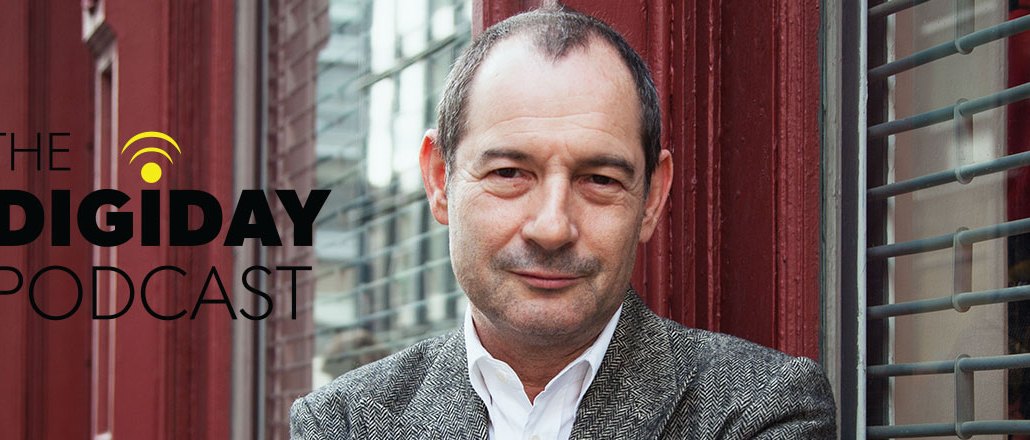Secure your place at the Digiday Publishing Summit in Vail, March 23-25

Facebook is a once-in-a-generation company, boasting a global user base of 1 billion users a day and an advertising business that raked in $3.8 billion last year.
But the questions that dogged Facebook from advertisers remain in many ways, according to Rob Norman, chief digital officer at GroupM, the world’s largest media buying agency. That’s because Facebook hasn’t yet proven that it is a natural fit for advertising messages, not to mention its continued problem proving the value of ads there compared to other media.
“Advertisers have a significant difficulty getting their heads around what the real social significance is from an advertising point of view,” Norman said on this week’s Digiday Podcast. “Is advertising welcome on Facebook? I’m not sure it is. Is the preponderance of app-install ads welcomed by users? I’m not sure it is.”
Facebook might have an app-install bubble.
Any user of Facebook knows the popularity of ads pushed on them to download the latest mobile application. With venture capital money still sloshing around Silicon Valley, many app makers are in a race to be one of the chosen few that is regularly used by large numbers of people. That could pose a problem to Facebook, Norman said, simply based on the fact that the vast majority of apps are doomed to irrelevance.
“It makes you wonder about the durability of an app install market where the battle for the app makers is for the first two screens,” he said.
Facebook and Google have a (TV) measurement problem.
Both Google’s YouTube and Facebook boast incredible video numbers. Yet for all the ad dollars flowing to both platforms, they won’t start to get a piece of TV budgets until there’s a common way to measure the effectiveness of video ads, which are often viewed fleetingly and with the sound off, against a TV commercial exposure.
“Unlike a Nielsen-like world, however imperfect that world is, it does allow for extraordinarily good, side-by-side comparisons to all of the players in the game of television,” Norman said. “If Google and Facebook want to sit at the same video table as television, as they clearly do, you have to sit at the table with the same cutlery and be measured the same way.”
Twitter isn’t Facebook, and that’s OK.
Wall Street and Silicon Valley types often bemoan the state of Twitter, pointing to its 316 million user base as evidence that it can’t “scale” its service. But advertisers, hardly at a loss for mass reach options, don’t compare Twitter to Facebook and, in many ways, appreciate it for what it is rather than what it is not, Norman said.
“Thinking that the growth vector of Twitter users is the measure on which people should value it is just simply wrong,” he said. “It would be like saying Vogue couldn’t be successful unless it sold five times more copies than it does. The reason why Vogue is successful is it’s consumed by people of influence and affluence. People of influence and affluence are valuable to advertisers. When I think of Twitter, I think of affluentials.”
Yahoo’s not cool, but it still matters.
Yahoo is the perennial sick man of Silicon Valley, in seemingly perpetual turnaround mode. And that’s with good reason: It has not just lost its luster with investors and tech types but with advertisers, too. Norman said most brands aren’t focused on Yahoo, as opposed to the newer platforms with more pizzazz.
“The question is whether they’re right to not focus on Yahoo,” Norman said. “Like it or not, Yahoo still has an enormous audience. Yahoo is middle America’s Internet, and middle America has been fertile ground for advertisers for an awfully long time. The Internet’s been more vulnerable to shifts in taste among advertisers and agencies than media has traditionally been. There’s value to be secured in Yahoo by advertisers that’s going unrecognized simply because it’s not fashionable.”
More in Media

Media Briefing: As AI search grows, a cottage industry of GEO vendors is booming
A wave of new GEO vendors promises improving visibility in AI-generated search, though some question how effective the services really are.

‘Not a big part of the work’: Meta’s LLM bet has yet to touch its core ads business
Meta knows LLMs could transform its ads business. Getting there is another matter.

How creator talent agencies are evolving into multi-platform operators
The legacy agency model is being re-built from the ground up to better serve the maturing creator economy – here’s what that looks like.





